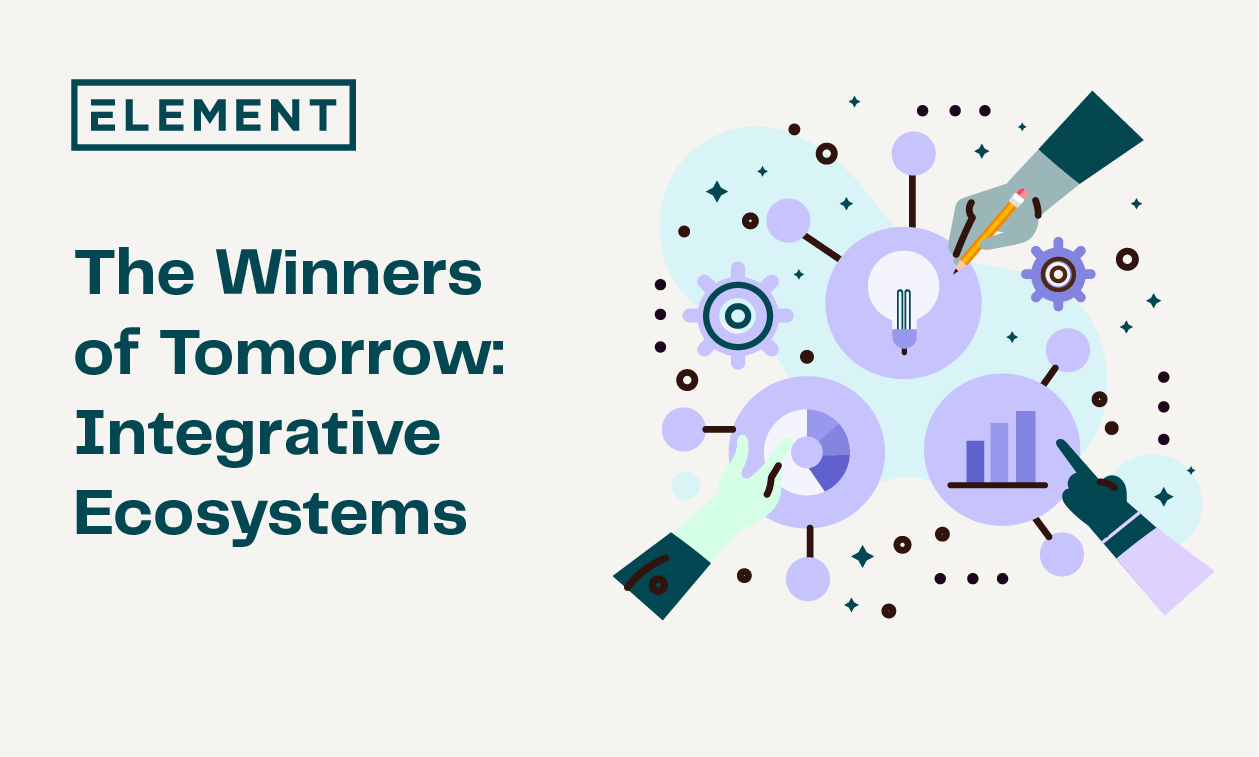
The Winners of Tomorrow: Integrative Ecosystems
Or why 'insurers' will still thrive when the word 'insurance' is not relevant anymore.
It is already clear that the world of tomorrow will be different. The digital transformation is advancing rapidly in all areas of life: from offline to online shopping, from PCs to mobile devices, from trusted stores to price and comparison portals, from 'one-size-fits-all' to individual tailored offerings, from posters and TV advertising to social media and influencer marketing. The changes of recent years have been shaped by platforms that have made various services available and consumable online under a unified brand.
Some of these platforms have grown into large corporations like Apple or Amazon, which have understood that today it's more about solutions than products - all under their own brand. These corporations represent traditional ecosystems that also have room for external partners.
Tomorrow's winners will be specialized unique players
There is a trend that can already be experienced today and will become even stronger in the future: customers are not only looking for products but for experiences. Some examples of these experiences include overnight stays connected to an event or a specific show, all-inclusive flight packages with various offerings, or even complete bicycle tour packages that include full service. For instance, if an accident occurs during your next bike tour, accommodation will be reserved directly, and a spare bicycle provided while your own is being repaired. The service is provided proactively, and the customer does not have to do anything else.
Companies that offer a wide network of products and services and connect them seamlessly in a unique experience will meet the needs and desires of tomorrow's customers. To be successful, those companies need to partner and collaborate with different suppliers, which will allow them to offer an all-encompassing service experience. Companies that take advantage of these opportunities will have a competitive edge in the years to come.
What is an integrative ecosystem? And why is this connected to the (ir-)relevance of the word 'insurance'?
All of the earlier examples of customer experiences have one thing in common: they take place in integrative ecosystems. Within these integrative ecosystems, each individual team player concentrates on their core competence. Different team players connect seamlessly and are not necessarily previously linked through a holding company, but through certain values, rules and shared technologies.
Integrative ecosystems go one step beyond traditional ecosystems. They not only offer complementary services but also break down the value chain, allowing each partner to flexibly engage in different aspects. Hence, collaboration between partners is taken to the next level. Since each partner focuses on their core area and can contribute with their specific expertise, this approach enhances a unified and distinctive user experience.
In addition to e-commerce providers, retailers and other B2C companies, insurers and intermediaries also play a role for service experiences. Property insurers offer event cancellation or liability insurance for events. Health and travel insurers offer transportation back home during a trip. For an all-encompassing bicycle insurance, both property insurers and assistance providers are needed. The most important thing: everyone involved works hand in hand, so that the customer is guaranteed a positive service experience without interruptions.
The insurance component of the offering is integrated with other non-insurance products or services, ensuring that consumers have a comfortable and flawless experience. Insurance is seamlessly included where consumers need it most, customized to their overall needs. The term 'insurance' is no longer utilized in this context - and is thus expected to become obsolete.
How does an insurer succeed in these integrative ecosystems? And what are the key questions every company should be asking itself?
1. Be a team player:
In integrative ecosystems, teamwork is essential. Only those who know their team and coordinate their strengths with those of the rest of the players will be successful. The customer experience should be constantly analyzed from start to finish, with improvements identified and adjustments promptly implemented. The lasting success of the service experience can only be achieved through continuous optimization. As an insurer, it's essential to prioritize your core competencies while actively engaging with all relevant interfaces.
Key question for your company: As an insurer, do you want to, and are able to play in a team?
2. Know your boundaries:
Do you know your boundaries? You can only find the right partner if you know the strengths, weaknesses and limitations of your company and evaluate them fairly and honestly. It is also about selecting partners in your own core business and beyond, who help to close certain gaps in order to round off the service experience.Key question for your company: What can you already do today? And could you imagine covering parts of your own value chain through partners such as white label providers?
3. Embrace technology:
The right use of technology can mean the crucial difference between success and stagnation. There are already suitable technologies for almost every challenge. A good overview of available technologies and an understanding of potential partners helps to initiate the right internal steps in this field. Through the targeted integration of technologies and cooperation with technology experts, companies can optimize their business processes and develop innovative products and services.Key question for your company: Do you still build everything yourself or are you already part of a team where selected providers play a role?
These three success factors have one thing in common: the principle of "never stop adapting" applies. It is not enough for a company to decide and state that you are a team player, know your limits or have once drawn a technology roadmap. It is important to embed these skills in day-to-day business, continuously and permanently. They have to be put to the test and expanded again and again.
If all the mentioned success factors are consistently and sustainably implemented, your company will emerge as a significant partner within integrative ecosystems. This forms the foundation for establishing your presence as a key player in this ever-evolving world of experience-driven consumers. After all, we all are consumers: you and I, our children, and the generations of tomorrow. Don't forget that.

